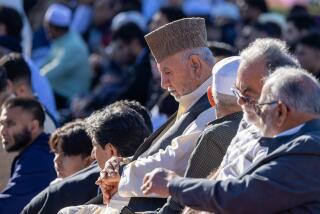ISLAM RISING : Terms of Islam
- Share via
* Sharia--”Revealed, canonic law by which the faithful should live,” put forth in the Koran and the Sunnah.
According to Islamic law, every act fits into one of six categories: fard , obligatory under law, such as the performance of prayer; wajib, obligatory through legal extrapolation but not expressly mentioned in the primary sources of the law so that its omission is no sin; mustahabb or mandub , not obligatory but recommended; mubah , permitted; makruh , not forbidden but discouraged; haram , forbidden.
Islam makes no distinction between religion and life; there is nothing “secular.” However, historically, there has often been a parallel legal system governing civil administration and commerce.
* Sunnah--Traditions relating to the deeds and utterances of the Prophet Mohammed, which may enunciate doctrine or provide a commentary upon it. They are the basis, second only to the Koran, for Islamic law.
* Islamic New Year--This year it falls on June 21, 1993. The Islamic calendar is called the Hegirian, dating from the migration of Mohammed to Medina in 622. It is based on cycles of the moon (the Western Gregorian calendar is based on cycles of the sun).
* Ramadan--A month of ritual fasting during which believers do not partake of food, drink or pleasures of the senses between daybreak and sunset. Ramadan occurs during the ninth month of the Arab and Islamic calendar.
* Hajj--Once-in-a-lifetime pilgrimage to the Grand Mosque in Mecca. It is an elaborate series of rites, requiring several days to accomplish. The pilgrimage is obligatory for those whose health and means permit it, and who can do it without compromising their responsibilities to their families.
* Zakat--Giving up a portion of one’s wealth, beyond what is needed for sustenance, to “purify” or legitimize what one retains. It is, in effect, a tax on possessions and may be paid directly to the poor as alms, or to travelers, or to the state.
* Chador--Persian word for tent-like cloak and veil worn by many women in the Middle East and South Asia. Modesty in dress--defined as covering everything except the face and hands in public--is a religious prescription for Muslim women. However, the wearing of a veil is not a requirement of Islam, but a matter of cultural acceptance.
* Jihad--from the Arabic jahd , or effort. Islamic experts say the concept has been widely misunderstood in the West. Jihad refers to striving for excellence on one of several levels. The first involves individual efforts, spiritual and intellectual, to become a better Muslim. The second addresses efforts to improve society. The third and last level, or “holy war,” involves self-defense or fighting against oppression. Adult males must participate if the need arises. An important precondition is that there be a reasonable prospect of success.
A jihad must end when order is restored or when the unbelievers have accepted either Islam or a protected status within Islam, or when Islam is no longer under threat. Islam teaches that on the battlefield, civilians, women, children, noncombatants and religious people of other faiths are not to be touched. It is impossible to undertake a jihad against Muslims. Those who die in a genuine jihad--and the rules are complex--are considered to be martyrs.
More to Read
Sign up for Essential California
The most important California stories and recommendations in your inbox every morning.
You may occasionally receive promotional content from the Los Angeles Times.













